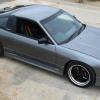Hsv More Fun....?
Announcements
-
Similar Content
-
Latest Posts
-
Yep I will use a guide coat after putting filler, I will do it on the whole panel as I'm a beginner so chances I've made quite a few errors. In that photo, I think that was a low spot, I just for example said to pretend it's flat but I will put filler + guide coat after to assess where I'm at. Yep with that picture, the panel is wet as it rained when I took the photo. But all those scratches are completely smooth, I went over it with 240 grit and can't feel it, even with my nail digging into it. I was legit thinking to buy a 2k can and spray primer to see how it turns out but then thought to myself it's going to be a mess doing it haha. Good mention there. Thanks for all that info I think I know what to do next.
-
By Murray_Calavera · Posted
Prior to laying down the primer, you need to make sure the surface is completely level. For example, based on this picture, I strongly suspect that the areas marked in blue are higher then the area marked in green. If you spray primer over this entire area, then paint and clear it, the finished result will 100% show the low area. It will stick out like dogs balls. Unfortunately the paint won't magically level out the low areas as you lay it down. Without seeing it in person, I expect that the green area will need to be filled, then use a guide coat and check that the entire repair area is level with a large sanding block. With this picture, are you saying that even though you can see the scratches, the panel is in fact completely smooth and flat? If this is the case sure you could prep and paint it as it is. The picture with the paint you described as blistering, it's hard for me to comment on from the photo alone. It looks like the panel is wet? Dunno, looks strange. Does the panel feel as smooth as glass when you run your hand over it? **** Going back to your question again, generally you would only sand the primer if you made a mistake while laying down the primer. If the panel is prepped properly and you lay the primer down properly, you should not need to sand the primer. This wouldn't work - Don't prep the panel. Spray primer and see how it turns out. Sand the areas where the issues appear. Spray more primer and see how it turns out. Sand the areas....... Yeah you'd go round and round in circles getting no where. -
That's sick, thanks for that, mine has much the same mods on a 400R. I just don't have the heat exchanger yet. Might be worth a trip down the M1 to Syndey for a tune.
-
Mate , this is the current mods list Current Mods list (Installed) RV37 Skyline 400R (SKYLINE) | FUJITSUBO - Cat Back RV37 Skyline 400R (SKYLINE) | FUJITSUBO - Front Pipe AMS - INFINITI Q50/Q60 RED ALPHA COLD AIR INTAKE KIT AMS - Performance Heat Exchanger Intercooler AMS Alpha Performance Full Race Down Pipes ECUTEK tune form TuneHouse in Sydney .(Just over 2k) The car came with HKS - Power Editor but I had it removed for the full tune. I would say if you are using the car for street diving a proper tune would be better.
-
Interested to see any videos of this or on the dyno. Mine currently has HKS secondary cats i am undecided if I want to remove them. What did it set you back to get the tube done? And what mods have you got to get that power? I was looking at a racebox flash tune but maybe a proper tune would be better if these guys are good.
-










Recommended Posts